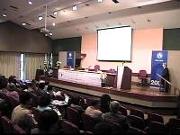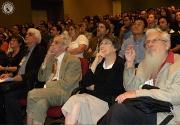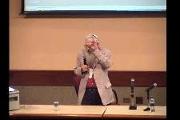Pesquisa realizada pelo termo "brazilian"

1- EUBR2009 - (Track 3) - Sala de Videoconferencia EPUSP
Workshop background and goals:
The Workshop EUBR 2009 will be held in the University of São Paulo (USP), São Paulo, Brazil from 8th to 9th of September 2009.
Its main goal is to promote collaboration, idea and exchange of experiences and joint research on Information and Communication Technologies (ICT) between Brazilian and European Union Academic and Scientific Communities as well industries.
This Workshop aims to address very important issues in ICT concerning Future Internet, e-infrastructure, Microelectronics/Microsystems and Embedded System & Control.
During this Workshop demonstrations of Future Internet projects will take place involving Brazil and European Academic and Scientific partners in the area of music and cinema, showing as ICT can be a channel for fostering collaboration not only in the area of technology per se but also in other ones related to humanities.
Target group: Academic and Scientific Communities, IT professionals and industry representatives.
Format of the Workshop:
* It is organized in four sessions: Future Internet, e-infrastructure, Microelectronics/Microsystems and Embedded System & Control.
* More detailed information can be obtained in the program.
* The activities will be held at Electronic Computing Center (CCE) and Escola Politécnica, the Engineering School, of the USP.
Workshop Organization:
This Workshop is organized jointly by the European Commission, the Ministry of External Relations (MRE) and the Ministry of Science and Technology (MCT), with the support of the University of São Paulo, in the context of the in the context of the Political Dialogue between Brazil and the European Union in the Information Society field.
Duração: 02:55:42

17th International Input-Output Conference
On behalf of the Local Organizing Committee, I am delighted to welcome you to this, the 17th International Input-Output Conference of the International Input-Output Association.
The Local Organizing Committee at the Department of Economics,
School of Economics, Business and Accountancy, at the University of São Paulo (USP) is proud to host the 17th International Input-Output Conference for the first time in Brazil. A team of professors and researchers throughout Brazil has worked hard to put together a quality program, and the support team at USP has been doing a superb job to make sure that this will be an event to remember.
São Paulo is one of the largest cities in the world, with over 18 million people in its metropolitan area. It hosts around 15% of Brazilian GDP and is the heart of the Brazilian economy. It is metropolitan in nature, with a diversified population, composed of Italians, Germans, Japanese (the largest community outside Japan), Lebanese, Chinese, Koreans, Spaniards and, of course, Portuguese.
USP is considered to be the most important Brazilian University. Its scientific production amounts to 28% of the whole production in Brazil, placing USP among the top three higher-education institutions in Latin America and among the top 200 in the world (The Times Higher Education Supplement).
The Department of Economics at USP currently has around one thousand undergraduate and graduate students who enjoy the privilege of having a complete university facility at their disposal with no tuition fees. They make a highly qualified student body as a result of the highly competitive entrance selection process. Students at the Department of Economics have also at their disposal first-rate faculty: more than 70 professors holding a Ph.D., most of them obtained abroad at leading universities.
With around 250 papers submitted by 430 authors and coauthors from 48 different countries, of which 162 papers were chosen for presentation, it is possible to forecast that this will be a stimulating meeting with quality papers and debates, making it possible to go from data discussions, passing through advances in theory, to culminate into Leontief´s goal of having a better understanding of the economic, social, environmental and political reality of the World that we live.
I do hope that you could share with us the high hopes of this meeting and at the same time, also share a little of the natural beauties of Brazil.
Joaquim J.M. Guilhoto
Chair LOC
Duração: 01:39:32

17th International Input-Output Conference of the International Input-Output Association.
On behalf of the Local Organizing Committee, I am delighted to welcome you to this, the 17th International Input-Output Conference of the International Input-Output Association.
The Local Organizing Committee at the Department of Economics,
School of Economics, Business and Accountancy, at the University of São Paulo (USP) is proud to host the 17th International Input-Output Conference for the first time in Brazil. A team of professors and researchers throughout Brazil has worked hard to put together a quality program, and the support team at USP has been doing a superb job to make sure that this will be an event to remember.
São Paulo is one of the largest cities in the world, with over 18 million people in its metropolitan area. It hosts around 15% of Brazilian GDP and is the heart of the Brazilian economy. It is metropolitan in nature, with a diversified population, composed of Italians, Germans, Japanese (the largest community outside Japan), Lebanese, Chinese, Koreans, Spaniards and, of course, Portuguese.
USP is considered to be the most important Brazilian University. Its scientific production amounts to 28% of the whole production in Brazil, placing USP among the top three higher-education institutions in Latin America and among the top 200 in the world (The Times Higher Education Supplement).
The Department of Economics at USP currently has around one thousand undergraduate and graduate students who enjoy the privilege of having a complete university facility at their disposal with no tuition fees. They make a highly qualified student body as a result of the highly competitive entrance selection process. Students at the Department of Economics have also at their disposal first-rate faculty: more than 70 professors holding a Ph.D., most of them obtained abroad at leading universities.
With around 250 papers submitted by 430 authors and coauthors from 48 different countries, of which 162 papers were chosen for presentation, it is possible to forecast that this will be a stimulating meeting with quality papers and debates, making it possible to go from data discussions, passing through advances in theory, to culminate into Leontief´s goal of having a better understanding of the economic, social, environmental and political reality of the World that we live.
I do hope that you could share with us the high hopes of this meeting and at the same time, also share a little of the natural beauties of Brazil.
Duração: 01:27:40

17th International Input-Output Conference of the International Input-Output Association. 17/07/09
On behalf of the Local Organizing Committee, I am delighted to welcome you to this, the 17th International Input-Output Conference of the International Input-Output Association.
The Local Organizing Committee at the Department of Economics,
School of Economics, Business and Accountancy, at the University of São Paulo (USP) is proud to host the 17th International Input-Output Conference for the first time in Brazil. A team of professors and researchers throughout Brazil has worked hard to put together a quality program, and the support team at USP has been doing a superb job to make sure that this will be an event to remember.
São Paulo is one of the largest cities in the world, with over 18 million people in its metropolitan area. It hosts around 15% of Brazilian GDP and is the heart of the Brazilian economy. It is metropolitan in nature, with a diversified population, composed of Italians, Germans, Japanese (the largest community outside Japan), Lebanese, Chinese, Koreans, Spaniards and, of course, Portuguese.
USP is considered to be the most important Brazilian University. Its scientific production amounts to 28% of the whole production in Brazil, placing USP among the top three higher-education institutions in Latin America and among the top 200 in the world (The Times Higher Education Supplement).
The Department of Economics at USP currently has around one thousand undergraduate and graduate students who enjoy the privilege of having a complete university facility at their disposal with no tuition fees. They make a highly qualified student body as a result of the highly competitive entrance selection process. Students at the Department of Economics have also at their disposal first-rate faculty: more than 70 professors holding a Ph.D., most of them obtained abroad at leading universities.
With around 250 papers submitted by 430 authors and coauthors from 48 different countries, of which 162 papers were chosen for presentation, it is possible to forecast that this will be a stimulating meeting with quality papers and debates, making it possible to go from data discussions, passing through advances in theory, to culminate into Leontief´s goal of having a better understanding of the economic, social, environmental and political reality of the World that we live.
I do hope that you could share with us the high hopes of this meeting and at the same time, also share a little of the natural beauties of Brazil.
Duração: 01:53:16

17º International Input-output Conference, 13 a 17 de julho
On behalf of the Local Organizing Committee, I am delighted to welcome you to this, the 17th International Input-Output Conference of the International Input-Output Association.
The Local Organizing Committee at the Department of Economics,
School of Economics, Business and Accountancy, at the University of São Paulo (USP) is proud to host the 17th International Input-Output Conference for the first time in Brazil. A team of professors and researchers throughout Brazil has worked hard to put together a quality program, and the support team at USP has been doing a superb job to make sure that this will be an event to remember.
São Paulo is one of the largest cities in the world, with over 18 million people in its metropolitan area. It hosts around 15% of Brazilian GDP and is the heart of the Brazilian economy. It is metropolitan in nature, with a diversified population, composed of Italians, Germans, Japanese (the largest community outside Japan), Lebanese, Chinese, Koreans, Spaniards and, of course, Portuguese.
USP is considered to be the most important Brazilian University. Its scientific production amounts to 28% of the whole production in Brazil, placing USP among the top three higher-education institutions in Latin America and among the top 200 in the world (The Times Higher Education Supplement).
The Department of Economics at USP currently has around one thousand undergraduate and graduate students who enjoy the privilege of having a complete university facility at their disposal with no tuition fees. They make a highly qualified student body as a result of the highly competitive entrance selection process. Students at the Department of Economics have also at their disposal first-rate faculty: more than 70 professors holding a Ph.D., most of them obtained abroad at leading universities.
With around 250 papers submitted by 430 authors and coauthors from 48 different countries, of which 162 papers were chosen for presentation, it is possible to forecast that this will be a stimulating meeting with quality papers and debates, making it possible to go from data discussions, passing through advances in theory, to culminate into Leontief´s goal of having a better understanding of the economic, social, environmental and political reality of the World that we live.
I do hope that you could share with us the high hopes of this meeting and at the same time, also share a little of the natural beauties of Brazil.
Duração: 01:33:23

2- EUBR2009 - (Track 3) - Sala de Videoconferencia EPUSP
Workshop background and goals:
The Workshop EUBR 2009 will be held in the University of São Paulo (USP), São Paulo, Brazil from 8th to 9th of September 2009.
Its main goal is to promote collaboration, idea and exchange of experiences and joint research on Information and Communication Technologies (ICT) between Brazilian and European Union Academic and Scientific Communities as well industries.
This Workshop aims to address very important issues in ICT concerning Future Internet, e-infrastructure, Microelectronics/Microsystems and Embedded System & Control.
During this Workshop demonstrations of Future Internet projects will take place involving Brazil and European Academic and Scientific partners in the area of music and cinema, showing as ICT can be a channel for fostering collaboration not only in the area of technology per se but also in other ones related to humanities.
Target group: Academic and Scientific Communities, IT professionals and industry representatives.
Format of the Workshop:
* It is organized in four sessions: Future Internet, e-infrastructure, Microelectronics/Microsystems and Embedded System & Control.
* More detailed information can be obtained in the program.
* The activities will be held at Electronic Computing Center (CCE) and Escola Politécnica, the Engineering School, of the USP.
Workshop Organization:
This Workshop is organized jointly by the European Commission, the Ministry of External Relations (MRE) and the Ministry of Science and Technology (MCT), with the support of the University of São Paulo, in the context of the in the context of the Political Dialogue between Brazil and the European Union in the Information Society field.
Duração: 03:21:16

2nd Brazilian Workshop of the Game Theory Society, in honor of JOHN NASH (Cerimônia de Abertura)
[em inglês] O Equilíbrio de Nash, conceito que revolucionou a teoria econômica e rendeu a seu criador, John Nash, o prêmio Nobel de Economia em 1994, completa 60 anos. Como parte das comemorações, a FEA recebeu, entre 29 de julho e 4 de agosto, o 2nd Brazilian Workshop of the Game Theory Society. O evento reuniu palestras, apresentações de trabalhos e mini-cursos ministrados por convidados de diversas instituições brasileiras e estrangeiras.
As atividades abordaram mais de trinta tópicos referentes à teoria dos jogos, ramo da matemática aplicada que analisa o comportamento de pessoas ou grupos em situações estratégicas, buscando criar modelos para suas reações.
Créditos: Marina Pastore (Site da FEA - 10/08/2010)
Duração: 00:24:52

2nd Brazilian Workshop of the Game Theory Society, in honor of JOHN NASH (Dia 1 - Parte 1/4)
(Dia 1 - Parte 1/4) Palestra [em inglês] NASH EQUILIBRIUM AND THE HISTORY OF ECONOMIC THEORY, do Prof. Dr. Roger Myerson (University of Chicago), Nobel em Economia de 2007.
O Equilíbrio de Nash, conceito que revolucionou a teoria econômica e rendeu a seu criador, John Nash, o prêmio Nobel de Economia em 1994, completa 60 anos. Como parte das comemorações, a FEA recebeu, entre 29 de julho e 4 de agosto, o 2nd Brazilian Workshop of the Game Theory Society. O evento reuniu palestras, apresentações de trabalhos e mini-cursos ministrados por convidados de diversas instituições brasileiras e estrangeiras.
As atividades abordaram mais de trinta tópicos referentes à teoria dos jogos, ramo da matemática aplicada que analisa o comportamento de pessoas ou grupos em situações estratégicas, buscando criar modelos para suas reações.
Créditos: Marina Pastore (Site da FEA - 10/08/2010)
Duração: 00:53:09

2nd Brazilian Workshop of the Game Theory Society, in honor of JOHN NASH (Dia 1 - Parte 2/4)
Palestra [em inglês] WHERE NASH BARGAINING HAS LED, do Prof. Dr. Robert Aumann ( The Hebrew University of Jerusalem & SUNY at Stony Brook), Prêmio Nobel em Economia de 2005.
O Equilíbrio de Nash, conceito que revolucionou a teoria econômica e rendeu a seu criador, John Nash, o prêmio Nobel de Economia em 1994, completa 60 anos. Como parte das comemorações, a FEA recebeu, entre 29 de julho e 4 de agosto, o 2nd Brazilian Workshop of the Game Theory Society. O evento reuniu palestras, apresentações de trabalhos e mini-cursos ministrados por convidados de diversas instituições brasileiras e estrangeiras.
As atividades abordaram mais de trinta tópicos referentes à teoria dos jogos, ramo da matemática aplicada que analisa o comportamento de pessoas ou grupos em situações estratégicas, buscando criar modelos para suas reações.
Créditos: Marina Pastore (Site da FEA - 10/08/2010)
Duração: 00:47:06

2nd Brazilian Workshop of the Game Theory Society, in honor of JOHN NASH (Dia 1 - Parte 3/4)
[em inglês] CONVERSATION WITH JOHN NASH, entre a Profa. Dra. Marilda Sotomayor, o Prof. Dr. Aloísio Araújo e o Prof. Dr. John Nash, Prêmio Nobel em Economia de 1994.
O Equilíbrio de Nash, conceito que revolucionou a teoria econômica e rendeu a seu criador, John Nash, o prêmio Nobel de Economia em 1994, completa 60 anos. Como parte das comemorações, a FEA recebeu, entre 29 de julho e 4 de agosto, o 2nd Brazilian Workshop of the Game Theory Society. O evento reuniu palestras, apresentações de trabalhos e mini-cursos ministrados por convidados de diversas instituições brasileiras e estrangeiras.
As atividades abordaram mais de trinta tópicos referentes à teoria dos jogos, ramo da matemática aplicada que analisa o comportamento de pessoas ou grupos em situações estratégicas, buscando criar modelos para suas reações.
Créditos: Marina Pastore (Site da FEA - 10/08/2010)
Duração: 00:31:43
 Carregando
Carregando





